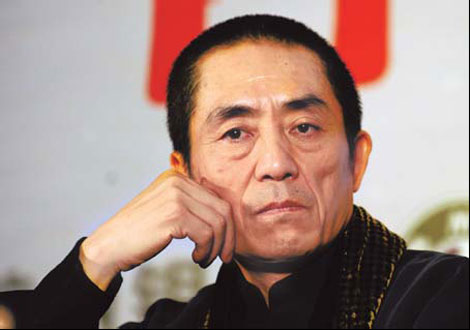Director with the Midas touch
Updated: 2011-12-09 08:12
By Liu Wei (China Daily)
|
|||||||||||
|
Zhang Yimou, the celebrated Chinese filmmaker, is known to produce lavishly-made films and for his understanding of Chinese audiences. Provided to China Daily |
Though he has a penchant for melodrama in his films, Zhang Yimou is often seen as the man with the pulse on the Chinese box office. The celebrated director of Red Sorghum and To Live has through his films made the world realize that China is not only a large market for Hollywood films, but also for homemade blockbusters.
Zhang's Hero, made in 2001 on a budget of $30 million, and released in 2002, one year after China's WTO entry, has been one of the most successful Chinese films in recent times and also enjoyed considerable success in overseas markets. The film broke box-office records with receipts of more than 240 million yuan ($38 million) in the domestic market, and netted a record $170 million globally.
Zhang is also an inspiration for domestic filmmakers to come up with offerings that are worthy adversaries for the Hollywood films that held sway over the Chinese box office since 1994.
From an industry perspective, many see the success of Hero in global markets as Zhang's ability to cash in on the opportunities that arose after China's WTO entry.
One of these was the regulation that allowed more private and foreign capital in production, distribution and screening of domestic films. It was considered by industry circles to be a path-breaking move as till then the entire gamut of film production was vested with State-owned enterprises.
Hero was co-produced and distributed by Beijing New Picture Film Co, a private company run by Zhang Weiping, a long-time friend of Zhang Yimou. The former came up with several brave marketing strategies for the film, like having the grand premiere of the film at the Great Hall of the People, a venue normally used for top political meetings, and an auction for the rights to make home entertainment products based on the film. Such innovative steps paid off and soon the film was the major talking point for the media and the general public.
Hero also created a storyline that was since imitated by several other directors, who followed it to have stellar star casts for an ancient tale featuring lavish palaces, roof-flying characters and imperial conspiracies.
To some extent it also looked logical, as ancient stories were less likely to offend the censors, whereas the kungfu scenes and top stars would automatically attract overseas distributors. Filmmakers like Zhang had by then realized that kungfu was the best way to attract overseas audiences.
Zhang's hold over domestic and overseas markets continued with House of Flying Daggers in 2004 and Curse of the Golden Flower in 2006. The two period kungfu dramas, despite the battering from film critics, were the highest grossing films in the respective years. Daggers earned 150 million yuan, 70 million yuan more than The Lord of the Rings' last episode screened in China the same year. Zhang used his personal clout, aesthetic splendor and innovative marketing skills to make his films the cynosure of all.
Benefiting from the audiences' growing passion for homegrown cinema were many other directors, like Feng Xiaogang and Chen Kaige, who made their own Chinese blockbusters like The Banquet and The Promise.
Zhang's ability to control grand scenes and his understanding of China's history and people, is amply demonstrated in his film career of over 30 years and also landed him the job of directing the opening ceremony for the Beijing Olympics.
His first work after that was to adapt Coen brothers' Blood Simple into the slapstick A Simple Noodle Story. "I used to rely heavily on overseas markets, but definitely not now," he said before Noodle Story hit the screens in December 2009.
"Over the next 10 years, the Chinese film industry will develop rapidly. Maybe within five years we will have a film that brings in $100 million," he said at that time.
Domestic box-office revenues reached 6 billion yuan in 2009 and have seen steady growth of 30 percent from 2003 onwards. Zhang's expectations were more or less realized in 2010 when Jiang Wen's film Let the Bullets Fly, had domestic box-office receipts of more than 700 million yuan.
Currently Zhang is working with top Hollywood actors like Christian Bale and crew on his latest war epic The Flowers of War, the mainland's entry for this year's best foreign-language film Academy Award.









